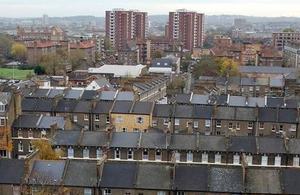Many refugees now get as little as seven days notice to move out of asylum accommodation
Over 140 NGOs have sent an open letter to the Home Secretary and the Secretary of State for Levelling Up, Housing and Communities urging the Government to abandon recent changes to the 'move-on' period for newly recognised refugees.
 Image credit: UK GovernmentYou can read the letter here.
Image credit: UK GovernmentYou can read the letter here.
The Refugee Council noted that the changes mean people are now getting a significantly shorter notice time to leave their accommodation after being granted refugee status.
NACCOM, the No Accommodation Network, explained: "The changes, which were enacted on August 1st, drastically shorten the move-on period for people leaving asylum accommodation after a positive decision. The current move-on period for people with refugee status is 28 days, however many refugees are now being given as little as seven days to move out of their asylum accommodation, find new accommodation and access welfare support, before their asylum support is stopped (known as cessations)."
The open letter explains further: "For many years the Home Office has recognised that it is impossible for someone to secure alternative accommodation, find employment, open a bank account or apply for welfare benefits until they receive their Biometric Residence Permit (BRP). That is why the department's policy has been that the 28-day 'move-on' period starts when a person receives their BRP – indeed several Home Office ministers have relied on that policy when arguing against calls to extend the move-on period."
It continues: "The recent changes worsen this situation by starting the 28 days when someone receives a grant letter telling them their protection claim has been accepted, instead of when they receive their BRP. There is usually a minimum delay of between 7 and 10 days between the receipt of the grant letter and a BRP being delivered, meaning someone will already be well into the 28 days before they can even start to engage with the processes that are vital for them to avoid homelessness and destitution. Many local authorities will also only begin to provide homelessness prevention services once someone has received a discontinuation letter informing them their asylum support will end or the notice to quit."
The letter says the change is causing severe hardship for refugees, as well as placing unnecessary pressures on local authorities who are already facing challenges finding accommodation for other groups.
A significant number of refugees are being made homeless, leading to an increase in rough sleeping. As a result, huge pressures is being placed on the voluntary sector, including refugee hosting and housing schemes, and mainstream homelessness services.
NACCOM commented: "The issuing of seven-day NTQs ['Notice to Quit' letters] to a significant number of refugees, as part of the changes to the cessations process, has triggered a surge in referrals to providers of hosting and housing accommodation in the NACCOM network, creating unprecedented demand for bed spaces, which will also be felt by Local Authorities. The lack of prior notification from the Home Office has made managing this demand extremely challenging."
Matt Downie, chief executive of the homelessness charity Crisis, said: "It's frankly inhumane to expect people who have just been granted refugee status to leave their asylum accommodation within seven days. In the vast majority of cases, it's obvious to all of us that this can only lead to one outcome – homelessness and destitution. This is no way to start a new life in a country with a proud history of supporting people fleeing war and persecution."
In the open letter, the NGOs call on the Government to immediately reverse the changes so all refugees have a minimum of 28 days before they're required to leave their accommodation.
NACCOM's director, Bridget Young, said: "Whilst we appreciate the urgent need to move people out of hotels and into more appropriate, community-based accommodation, the way to achieve this is not by evicting them into homelessness. … We urge the Government to commit to providing all refugees with at least 28-days from the date they receive their notice to quit before their asylum support ends, and to work with the voluntary sector and Local Authorities to ensure people can access adequate and timely support. Ultimately, only the introduction of a 56-day move-on period, in line with the Homelessness Reduction Act, along with substantial investment in affordable housing, will significantly mitigate the risks of homelessness that new refugees face when leaving the asylum system."
The NGOs warn that the situation will only get worse if, as the Government intends, the backlog of asylum claims is processed more quickly and therefore more people become eligible for homelessness assistance.
In response to the letter, a Home Office spokesperson told The Independent: "The pressure on the asylum system has continued to grow, with hotel accommodation costing an unacceptable £6m a day. We encourage individuals to make their onward plans as soon as possible after receiving their decision, whether that is leaving the UK following a refusal, or taking steps to integrate in the UK following a grant."